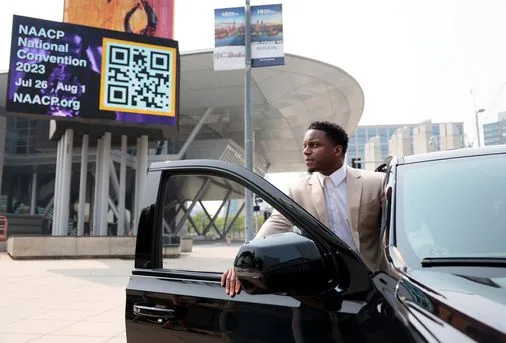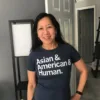
There’s a narrative about entrepreneurship in Boston that has been perpetuated for too long: Black-owned businesses don’t get contracts because they either don’t exist, or they don’t have enough experience to take on a big job.
The arrival of the NAACP convention in Boston this week presents an ideal moment to start rewriting that story. Already, the civil rights organization — which will spend millions of dollars here — has hired dozens of local Black-owned businesses as vendors. They represent the breadth of what the Black community has to offer: event planning, strategy, operations, public relations, marketing, website design, printing, transportation services, and more.
One of the biggest vendors is RoseMark Production, a Dorchester events planning firm owned and founded by Rose Staram. She has two six-figure contracts — one from the Boston NAACP chapter and the other from the City of Boston. RoseMark is organizing a variety of events, from an invitation-only golf outing at The Country Club in Brookline to a reception for 4,000 delegates at the Westin Hotel in the Seaport District.
Staram, who grew up in Mattapan, said those contracts, which together are valued at more than $1 million, are the biggest she’s landed in Boston. As successful as she is — her company worked on President Biden’s inauguration and that of Maryland Governor Wes Moore — she has found it difficult to win lucrative contracts in her hometown.
“I’m in D.C. constantly, everywhere but Boston because Black companies do not get the opportunity,” said Staram. “It’s legacy contracts. It’s about the good old boys club.”
Staram said she only won her first contract with the city last year as part of Mayor Michelle Wu’s effort to get people to return downtown through a series of events called “Boston Together Again.”
When Staram secures a major contract, she aims to pay it forward, hiring women and people of color as subcontractors. One of her go-to partners has been Ieasha James of Endless Flair Events, a Boston company that specializes in events decor.
Staram is once again bringing in James for event design at the NAACP gathering.
“I pride myself on, no matter where I go, I want women and I want people of color … only because it was so hard for me to get to a place that I can actually make those types of decisions,” said Staram.
For Boston NAACP branch president Tanisha Sullivan, it wasn’t enough that the 114th national convention be held here. She wants it to have a lasting impact, including by giving under-represented entrepreneurs a chance to grow their businesses. So Sullivan set a goal of hiring all women and Black entrepreneurs for projects related to the convention.
The local chapter came impressively close to hitting that mark: Black-owned businesses account for over 90 percent of its Boston convention contracts.
Meet Boston, the region’s tourism and visitors bureau, is providing transportation for thousands of delegates expected to attend the NAACP convention. The agency wanted to award its $280,000 transportation contract to a Black-owned business. The job is to shuttle attendees back and forth from hotels to the Boston Convention & Exhibition Center, where the event will be held.
When the agency couldn’t find a local company with enough capacity to handle the large-scale project, Boston economic chief Segun Idowu suggested that it approach Privé Parking. Owner Ricardo Pierre-Louis has been planning a bus service between Nubian Square and the Seaport District, and while that project has yet to launch, Idowu thought Pierre-Louis would have the know-how and connections to fulfill the contract.
Sure enough, Pierre-Louis had worked with a bus company in Maryland. For the NAACP, he crafted a proposal for Privé to provide private car services and manage transportation operations, while the Maryland company served as a subcontractor supplying buses and vans.
“Having on-the-ground experience is not [Pierre-Louis’s] only relevant skill,” said Idowu, who previously served as the president of the Black Economic Council of Massachusetts. “He’s got the tenacity, he’s got the contacts, he’s got the ambition.”
Idowu said companies too often don’t have confidence that entrepreneurs of color are capable.
“All we’re doing is making sure that for a Black convention, we are trusting Black contractors and entrepreneurs and giving them the opportunity to grow in these different industries,” he added.
Hilina Ajakaiye, executive vice president of Meet Boston, agreed, and awarded Pierre-Louis the contract.
“Many other event planners, meeting planners, and folks who are not Black and brown seek out their first project in this exact manner,” said Ajakaiye. “They’ve been given the grace to learn and to scale. That’s exactly what Ricardo and many Black-owned businesses need the opportunity to do.”
Until the NAACP event, Pierre-Louis had never thought about providing transportation for conventioneers. Now he sees it as a growth area for his Roxbury business that has primarily been focused on providing valet parking services to restaurants.
“It’s a game changer,” said Pierre-Louis. “Whether you’re in valet parking and figuring out where to put the cars, or whether you’re moving people from point A to point B, this is all logistics.”
The racial wealth gap in Boston is cavernous, in large part because of the lack of opportunity. Even though the city’s population has been majority-minority for more than two decades, entrepreneurs of color remain left behind.
For example, for the first half of this year, diverse vendors accounted for about $80 million, or about 12 percent of contracts awarded by the City of Boston. And that’s considered a marked improvement compared to previous administrations.
The NAACP convention can help change economic fates. According to Meet Boston, the gathering is expected to draw more than 7,000 attendees locally and nationally, and generate an economic impact of about $12.5 million.
Nicole Obi, president of the Black Economic Council of Massachusetts, said companies looking for suppliers often ask her whether there are enough qualified Black vendors.
Her response is always the same: “There are, but what we don’t have are enough people that are willing to give them a try.”
“I’m grateful for the NAACP having a mindset and being intentional,” she added. “But we can’t wait for Black-led events to come to town for us to then make economic inclusion a priority. We have capable, quality providers of goods and services that we should all be leveraging.”
Shirley Leung is a Business columnist. She can be reached at shirley.leung@globe.com.


